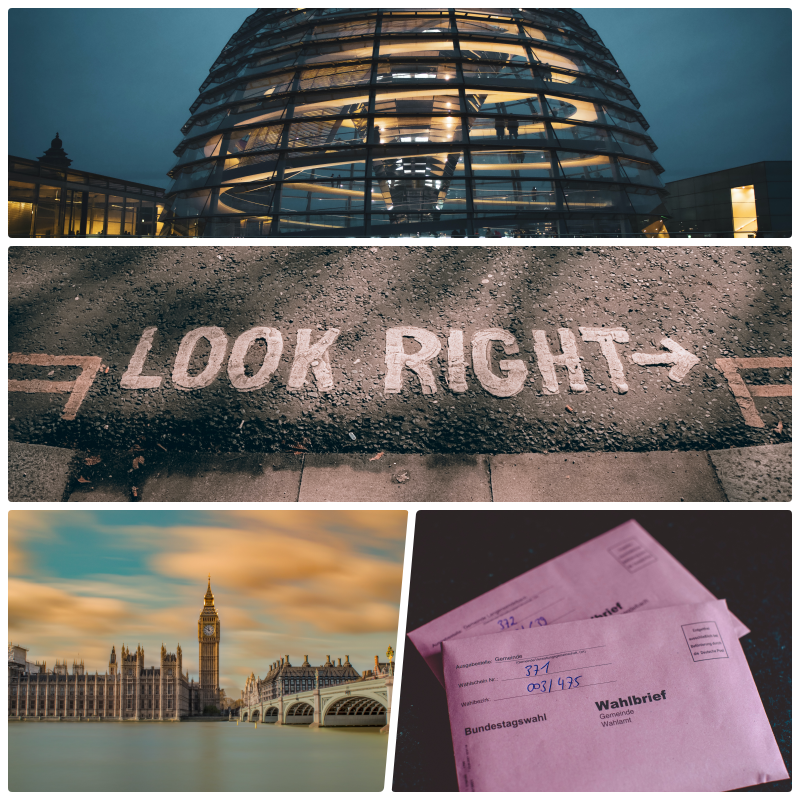Sliding Right
When I look at public debate in the UK in 2023, it’s unrecognisable from what I remember before I left for Germany in 2011. Things weren’t rosy in the British garden back then, but the idea that a right-wing government would sprout from the manure laid by David Cameron’s time as Prime Minister was hardly imaginable. Yet the seeds of Britain’s downfall were being sown with every austerity cut, and with every promise to lower migration. The rhetoric of that period may have been profoundly idiotic, with its talk of paying off the “national credit card” and the never ending list of acronyms JAMs (Just About Managing) to refer to those falling below the poverty line under the government’s watch, but it was nothing compared to what we hear today or during the never ending Brexit debate.
Now, Home Secretary Suella Braverman feels totally comfortable calling small groups of refugees arriving on boats an “invasion” in the House of Commons, while the country still hasn’t, and may never, fully recover from Boris Johnson’s willingness to call half the country traitors for not wanting to leave the EU. Back in 2010, this was the language of far-right parties like UKIP (UK Independence Party) led by Nigel Farage, a party that was once described by David Cameron as “loonies and fruit cakes”. So how did we end up where we are now? How did the British government become the representatives of what was once the lunatic fringe?
It’s an important question, and the answer is not only relevant to Britain. Here in Germany, it is vital to understand how Britain went from conservative centre-right administration to full throated far-right demagoguery, as the same process seems to be underway here. Each Sunday, various polling groups and news outlets release their results, forecasting what voters may do if there were to be an election in the near future. Since last Sunday, we’ve had to grapple with the realisation that Germany’s answer to UKIP, the AfD (Alternative für Deutschland), are either level with the current senior party in government, the SPD, at 18%, or in some polls sitting second, with 19%. This is shocking for various reasons, chief amongst them being that it’s the first time the far-right party has polled this high in its ten year history.
Obviously there are differences to mention, the most obvious of which is that the AfD have been represented in the Bundestag since 2017. Unlike UKIP and Nigel Farage, who never actually managed to get a UKIP politician elected, the AfD currently have 83 seats in Berlin. They have a massive influence in the east of the country, but also sit in all but two of the Landtage (state parliaments). Their scale dwarfs their British counterparts, and for many years I laboured under the illusion that this would actually help Germany. UKIP's success came from the fact they could influence politics from the outside, and were never held to the same standards as elected officials. It’s true the AfD can’t escape scrutiny, having been investigated numerous times by the Verfassungsschutz (Federal Office for the Protection of the Constitution) at both the national and state level, and have recently been declared a possible threat to the German constitution by the Deutsche Institut für Menschenrechte (The German Institute for Human Rights).
Despite all of this, people seem more willing to vote for the AfD than they did even three years ago. According to INSA, in 2020 74% of those asked said they would never vote for them under any circumstances. Now that number is only 55%. Moreover, 27% of those surveyed said that the AfD was just a normal democratic party like all the others. Clearly the ground is shifting rightwards under the feet of German politicians.
The reasons for this change has been much discussed, some fault must be allotted to the current governing coalition of SPD, Greens, and FDP. It seems that a week can’t go by without some kind of argument spilling out into the public square, but despite the disagreements and public spats, pinning all the blame the government would be ridiculous. However, this is exactly what the German opposition party, the CDU, has been doing all week, with their leader Friedrich Merz and his surrogates telling anyone who will listen that the reason the AfD are on the rise is simply down to the failings in the centres of national power. Of course, there is an irony in this accusation, as the CDU also must shoulder a large portion of responsibility too, after all, like David Cameron before the general election in 2015, Merz and co. have happily taken AfD talking points and used them to grab public attention numerous times in the hope of winning over voters from the far-right.
The media also must look at itself, and not only the tabloid press of BILD, the usual home of gutter journalism in Germany. Numerous outlets, as well as political discussions on TV, have allowed inaccurate stories about migrants attacking emergency services at New Year to spread, and when the truth of these stories were revealed, many chose not to correct the record. Though the media of Germany are practically angels when compared to Britain, where the power of the tabloids makes literal Kings and Queens shake with fear of being their focus, German news is often drawn to the sensational over the reality. The nonsense debate over heating pump legislation recently tabled by the government is only one very recent example.
There are many reasons that may explain the poll rise of the AfD, with economic concerns and war in Ukraine contributing in no small part, but it isn’t clear yet whether the resolution of these major issues will change the data. The Overton Window, the range of policies seen as acceptable to the mainstream population, is easily moved, especially when there are those happy to do so in order to grab headlines or sell ad space. When what is acceptable shifts, it stays shifted, as we can see in the UK today. There is no going back to before 2016. I hope for Germany’s sake, we won’t be wishing to go back to a time before 2023.
Proofreader: @ScandiTina
Image Credit
Photo by sebastiaan stam on Unsplash
Photo by Marcin Nowak on Unsplash
Photo by Massimiliano Morosinotto on Unsplash
Photo by Christian Lue on Unsplash
Photo by Markus Spiske on Unsplash









